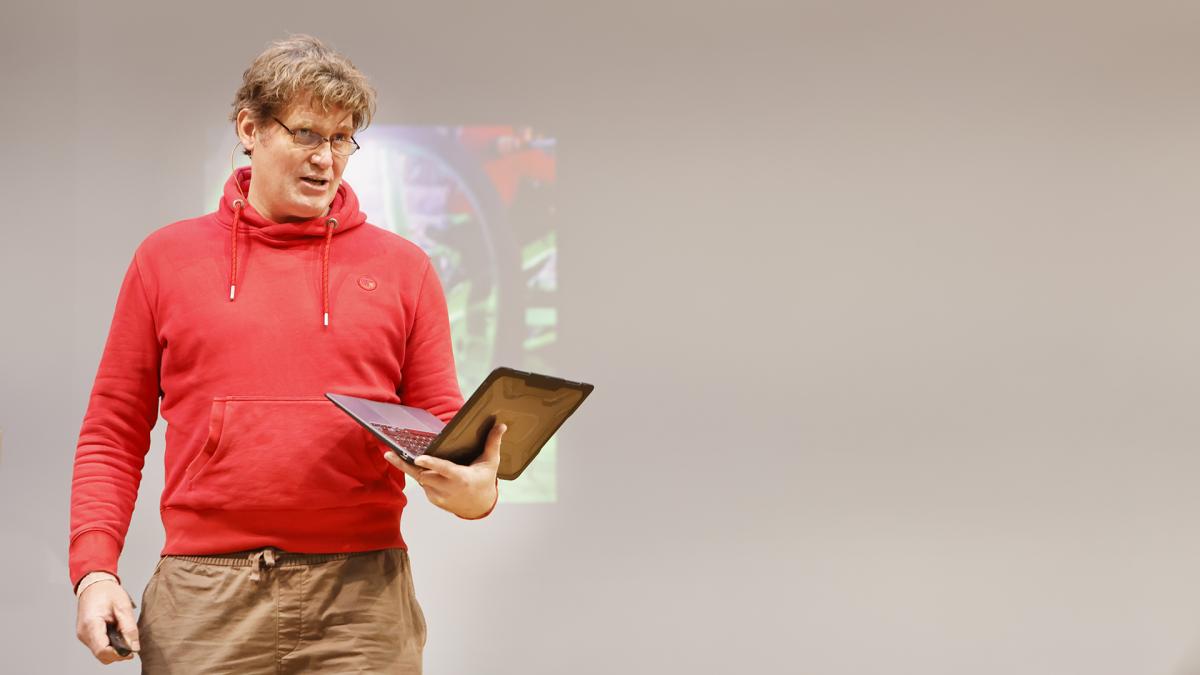Gaia Stage catches the energy of the audience
Musician, composer and researcher Dominik Schlienger has just finished his doctoral project in the music technology department at the Sibelius Academy. In autumn 2022, he participated in the Uniarts Hub pre-incubator program, where he developed his non-profit organization focused on carbon-neutral concert venue technology. He considers Uniarts Hub a good introduction to the business world.

Please tell us about yourself, and how did you realise that you wanted to study on the Uniarts Hub pre-incubator program?
I am a musician and researcher-composer. I am originally from Switzerland, but moved to Bristol, England in my twenties. I lived, studied and worked there for 12 years. I was active in the UK music festival scene in the 1990s and as a promoter of live music rave nights in Bristol until moving to Finland ten years ago with my Finnish wife. My musical background is in improvisation from jazz to free jazz, dance and trip-hop. I studied Creative Technology and Audio Production at the University of the West of England, UWE Bristol. I am researching music technology in quite a broad sense. I have just ended my doctoral project in the music technology department at the Sibelius Academy.
I saw Uniarts Hub as an opportunity to see behind the scenes of the so-called business world with some sympathetic guidance. My idea is for a non-profit organisation, with a distinctly market-critical stance. As my organisation Gaia Stage is a service provider, we are competing with commercial businesses that provide similar services. Even as a non-profit service provider, we still rely on a network of commercial businesses we might have shared synergies with. In order to understand these synergies, we need to understand the business world. Even if the course was over in 12 weeks, it was long enough to gain an insight.
I find it important for artists and musicians to understand that — even if artistic work is intended to express priceless values – the market will give artistic work a monetary value. By studying these market values, we may gain some control over them.
What is your business idea or project about?
My doctoral project started as a seemingly straightforward technical development project for spatial interaction for performance arts. However, it turned into a lengthy exploration of the role of technology – not only in arts, but also in all our lives. Through the project, it became increasingly evident to me that we as consumers neglect our ethical responsibility in deploying machines as part of our modern lives. Global warming can be traced back — more or less directly — to the use of human-made machines.
Somewhere along the line, I realised that I wanted to make a real difference in music technology: I came up with the idea for a low carbon footprint performance stage, where the audience helps to provide the energy by cycling bicycles that work as generators. By storing this energy in a big flywheel rather than batteries, Gaia Stage is even more environmentally friendly than other similar stages. With the big flywheel, it has an additional spectacular visual element. Depending on the size of the stage, the flywheel’s size can vary between a tractor wheel and a Ferris wheel.
What has participating in Uniarts Hub been like, what has the work consisted of?
Alongside working through a collection of contacts, materials and resources, we met an amazing array of active entrepreneurs and representatives of organisations assisting entrepreneurs. The Hub had a very practical approach: we were even paired with a mentor to assist us in the development of our ideas. The course culminated in a rehearsal pitch to a professional jury who commented on our ideas. We had some excellent coaching for the pitching. It was a great confidence booster for all of us. Even though many of us are professional performers, it was exciting.
What has been useful in Uniarts Hub, what have you learned?
To my surprise, I found many synergies with the so-called business world. I see now how a non-profit organisation can use the experiences and the knowledge of all kinds of entrepreneurs for its possibly more ethically-motivated purposes. In addition, I learnt that there seems to be an awareness – at least in the arts business sector we were introduced to – that business has to change in view of current challenges.
What kind of future do you dream of regarding your own career and your company/project?
I hope that Gaia Stage as an organisation can grow to promote, develop, finance and build low carbon stages. I hope it can operate as a social employer, paying living wages to all employees. Gaia Stage aims to be sustainable. Today, this term is often applied to mean sustainable growth — but that is not a concept we would want to endorse: In a world of finite resources, the emphasis has to be on sustaining biodiversity, sustaining all forms of life, not the profits of a few. An environmentally sustainable organisation should also aim to be socially just.
Join Uniarts Hub!
Are you an artist, producer, or intermediary in the art or creative industries thinking about starting your own business? The Uniarts Hub pre-incubator program provides an in-depth look at business operations in the arts and creative fields, as well as assistance in developing your own business idea. Applications for next spring’s program will be accepted from 1 December 2022 to 23 January 2023.
Art-Up: Artists in Business
Uniarts Hub pre-incubator programmer’s blog showcases the possibilities of entrepreneurship in the culture and arts industries.
Here you’ll get to know the Hub’s participants, inspiring people in the industry and thoughts on how to combine artistry and business.
Read more about the Uniarts Hub programme.
Latest posts
-
Creativity and Entrepreneurship: My Journey in the Uniarts Hub Pre-Incubator Program
-
Entrepreneurs in the creative sector pitched their fresh ideas in the Creatives Meetup event
Follow blog